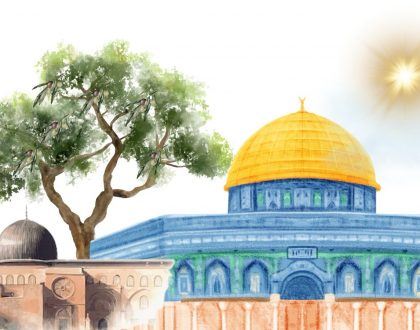Role Models
by Ayesha Khan
I wonder what many of you have aspirations to do in the future, and who you look to for inspiration?
It might be scientists, fashion designers, athletes, politicians? Writers?
What qualities made them successful? And what price do they have to pay for their success?
Success does not come easily. Some feel that they have to sacrifice a great deal to achieve what they want. Apart from hard work, sometimes celebrities who reach the top find that their personal lives are in crisis: relationships break down from the strain or they turn to substance abuse. Meanwhile politicians are no longer perceived as being totally honest. We wonder sometimes whose interests are they serving – their own or the people’s. And yet others seem to have lost their humanity and can become very ruthless.
If we cut to the past, to the 6th century – a time when the year had not even reached 4 digits, before the Battle of Hastings, Vikings are going around raiding Europe, Anglo Saxons had their settlements; it was a time of barbarians. Meanwhile in Arabia, there lived a fragmented set of tribal people.
Within 23 years, Prophet Muhammad* transformed the peninsula of Arabia from factions and tribes constantly at war with each other, who worshipped disparate gods and had endless superstitions, to a single nation all worshipping the same God. Where women, the weak, and the poor had been downtrodden, he insisted on their rights and established the laws of a fair society. He introduced the concept of hygiene. He emphasised good manners.
Drunkenness and gambling had been commonplace, but when he said it was prohibited the streets were awash as people emptied out their bottles. He promoted learning and gaining knowledge. People emerged from being in a state of complete ignorance and took learning to new heights, and Muslims went on to make important discoveries and inventions over the next millennia.
This person, who went on to transform the place he was born in, and set up a religion that is practiced by a quarter of the world’s population from one end of the globe to the other, what qualities did he have? If you asked his companions, you might be surprised at the answer.
Prophet Muhammad* was known for being honest, gentle, kind, charitable and simple. Children loved his company. You wouldn’t think, hearing those qualities, that we are describing the leader of a nation.
And what qualifications did he have? Had he been to Oxbridge/Harvard? Had he read books by the world’s greatest thinkers? No.
He had spent long periods of time on his own in reflection.
He had been troubled by the way society was.
But remarkably, he was an orphan, born in the middle of a desert, illiterate, and had grown up a shepherd (like all prophets*) and trader.
Yet even before he had become a prophet*, he showed intelligence and diplomacy. When the Kabah had to rebuilt after a file, the people needed to place the sacred Black Stone back. The different tribes were squabbling over who would do it, and he suggested that they place it on a sheet; they would all hold a corner of the sheet and then he himself lifted the stone and put it in place.
The rich merchants of Makkah were too arrogant to change their ways, and unhappy that it was the poor who were converting to Islam. So they approached Muhammad*, and tried to do a deal with him, saying they would convert if he would disassociate himself from the poor. But he refused. He said that Islam was not an exclusive club for the rich and that everyone is equal in the eyes of God.
As we know, we develop our character through our experiences in life.
Prophet Muhammad* stuck to his principles, and had the enormous strength of character not just to pass on the Message, but to endure extreme hardship and overcome massive difficulties in his life.
His lost his wife, whom he loved dearly and who had stood by him in his darkest moments and been by his side for 25 years.
He lost his children – he had three sons and four daughters, of which only one survived him, and even she died very soon after his death. When his baby son died, the tears rolled down his cheeks and there was a lunar eclipse. Some people commented that this was a miracle and a sign of his prophethood, but he did not agree and did not use this incident to his advantage.
The people who had admired and respected him and given him titles like ‘the Honest’ and ‘the Trustworthy’, turned against him and treated him with ferocious contempt once he began to preach.
He himself would be abused: he would have excrement thrown on him, entrails on his back while he was praying, thorns along the path he walked, he would be harassed, mocked and insulted. Imagine walking into to school one day and everyone treating you as if you are completely mad, lying and calling you a liar.
His friends and followers were persecuted, and he was threatened with violence. Eventually fed up, they plotted to kill him and came up with a complex plan which would involve a member from each clan, so that no one would get the blame afterwards. When that was foiled, they sent assassins after him. But every time the assassin’s horse approached him, the horse’s legs sank into the sand, and they gave up and converted.
Yet how did Muhammad* react? With patience, forgiveness and tremendous compassion.
Every day, a woman threw rubbish on him from her window. One morning, when she didn’t do it, he went to see if she was alright. She was ill, and when she saw his concern for her, who had shown him nothing but contempt, she converted immediately.
One day he went to visit the town of Taif but they were extremely hostile and the children threw stones at him until the blood ran down into his sandals. Angel Gabriel came to him and offered to crush the people between the mountains, but he refused and prayed that they and their future generations would accept his message one day. And that is exactly what happened.
When life became unbearable for the Muslims and they were being starved through a boycott and ostracised, they migrated to a town where Muhammad* was welcomed with huge respect.
They readily accepted him as their leader, however he showed no pride no arrogance. He gave away everything he had in charity and lived with complete humility and simplicity. He didn’t wear a crown, he didn’t have a throne, he didn’t build a palace. He slept on the floor and would wake at night for prayers. One night his wife put a mattress down for him and he overslept, so he never slept on it again. He would sweep the house, stitch his own clothes, mend his sandals, help the servants and eat with them.
When he was finally victorious against the people who had tried to kill him, and conquered Makkah, he entered the city on his camel with his head bowed. The Makkans were petrified that he would have them killed, but instead he forgave them and refused to take revenge.
He went on to establish a society in which he laid the foundations for people to coexist with other religions peacefully – Muslim, Christian, and Jewish people lived peacefully together for centuries.
For Muslims, looking at the life of Prophet Muhammed* holds many lessons for us, not just because he had such remarkable qualities as a human being, but because he is a very three-dimensional person, someone who was not just worshiping God but busy with worldly affairs, who fulfilled every role in an exemplary way: as a loving father, a caring husband, a successful business man, an effective teacher, an honourable leader and an incredible reformer – reshaping the entire peninsula and the customs of the people who lived there.
His teachings were to:
Always deal justly
Respect elders, neighbours and women
Control your anger
Forgive each other
Don’t spy on each other
Don’t say bad things about any one behind their backs
Don’t drink or gamble
Don’t be cruel to animals
Be kind to the poor, feed the hungry, comfort those who are sad
As Muslims, we look to the prophets for inspiration and as people whom we want to emulate in our lives.
Abraham*, Moses* and Jesus* are hugely respected by Muslims for their greatness of character and unswerving obedience to God. Muslims believe that God sent one final prophet almost 600 years after Jesus*, who was also descended from Abraham*.
He may have lived over 1400 years ago, but his life was documented in extensive detail by the people who lived around him at the time, and his sayings and his mannerisms and his character were narrated by them, memorised without any discrepancy and then passed down generations unaltered, so we have a goldmine of information about him that is authentic.
What we then get is a picture of an extraordinary person. Setting aside that he was chosen to bring a divine message, even if we look at him just from a historical point of view, we see him as an active social reformer, diplomat, merchant, philosopher, orator, legislator, military leader, humanitarian and philanthropist.
So successful was his in personal and religious life that he was ranked as the single most influential person in the world ever, by Michael Hart, who wrote a book listing the important figures in history. Muhammad ranked ahead of Isaac Newton, Jesus, Buddha and Einstein.
Some quotations that non-Muslims have said about him:
“Of all the religious personalities of the world, Muhammad was the most successful.” – Encyclopaedia Britannica, 11th edition.
“Never has a people been led more rapidly to civilization, such as it was, than were the Arabs through Islam.” – New Researches, by Hirschfeld
“It was the rigid simplicity, the utter self-effacement of the Prophet, the scrupulous regard for pledges, his intense devotion to his friends and followers, his intrepidity, his fearlessness, his absolute trust in God and in his own mission. These, and not the sword, carried everything before them and surmounted every obstacle. When I closed the second volume [of the Prophet’s biography], I was sorry there was not more for me to read of that great life.” – Gandhi
“He was by far the most remarkable man that ever set foot on this earth. He preached a religion, founded a state, built a nation, laid down a moral code, initiated numerous social and political reforms, established a powerful and dynamic society to practice and represent his teachings and completely revolutionized the worlds of human thought and behaviour for all times to come.” – George Bernard Shaw
*peace be upon him
Written by Ayesha Khan in 2012
Recommended Posts

Masjid al Aqsa – why it has a very special place in our hearts
November 29, 2023

Palestine: The Holy Land
November 23, 2023

